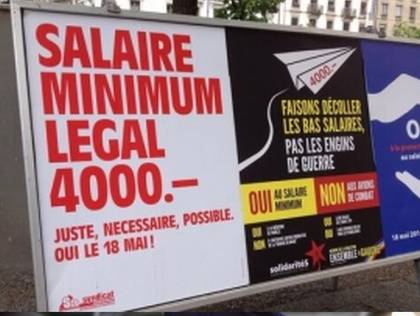The Swiss have overwhelmingly voted to reject proposals to create the world’s highest minimum wage because they were worried increased business costs could damage their economy.
In a referendum on Sunday, 76 per cent of voters turned down proposals made by the trade union SGB for a minimum wage of 22 francs (£15/$25) an hour.
Switzerland has no minimum wage, but the media wage is about 33 francs an hour. The minimum wage in neighbouring Germany will rise to €8.50 (£7/$11.50) in 2017.
Supporters said the move towards a high Swiss minimum wage was necessary for people to live a decent life, but critics argued that it would raise production costs, damage competitiveness and increase unemployment.
“If the initiative had been accepted, without doubt that would have led to job cuts, particularly in remote and structurally weaker regions,” Swiss Economy Minister Johann Schneider-Ammann said at a news conference. “The best remedy against poverty is work.”
In Britain, Labour leader Ed Miliband has pledged to increase the minimum wage if he leads the next Government. However, in a radio interview this morning, he refused to give a figure for the minimum wage he intends to introduce, but said he wanted it to rise in proportion to average earnings during the next parliament.
The British minimum wage is due to rise to £6.50 ($11) in October.
A key element of the Swiss campaign in favour of a minimum wage was the argument that the welfare system was being forced to subsidise businesses which refuse to pay a living wage. But according to a BBC report, business leaders and the government said low unemployment and high standards of living for the majority showed there was no need for change.
Switzerland is one of the richest countries on earth, with World Bank figures showing GDP per capita at $78,927 a head, compared with $38,919 in Britain and $51,748 in the US.
However, Swiss living costs are among the highest in the world. In the 2013 Mercer Cost of Living index for business assignments abroad, three out of the ten most expensive cities in the world are in Switzerland.
The minimum pay referendum was the third in Switzerland in the last 18 months to deal with the increasing gap between rich and poor people. Voters previously adopted restrictions on bonuses for corporate executives, but rejected controls that would have limited their salaries to no more 12 times that of the lowest paid workers, according to a report by Voice of America.
In February, the Swiss voted in a referendum to stop the free movement of persons between Switzerland and the European Union. Switzerland is an independent sovereign country and regulates its relations with the EU by a series of bilateral agreements.
In a 2000 referendum, the Swiss were persuaded to allow free movement from the EU. However, after the agreement came into force in 2002, the high immigration levels that followed, especially after the economic crash in the eurozone in 2008, and the subsequent pressure on social services and property prices, convinced the Swiss to vote that their government must either renegotiate or withdraw from the agreement within three years.
In another referendum on Sunday, the Swiss rejected a proposal to spend $3.5bn buying 22 Swedish-made Gripen fighter jets for the Swiss Air Force.
Switzerland traditionally supports a principle of well-armed neutrality and the government had argued it needed to replace its aging air-force fleet in order to support its armed forces. However, critics said it was an unnecessary expense.
“This decision will cause a security gap,” Defence Minister Ueli Maurer said. “We will do everything we can to fill this gap in these difficult circumstances as quickly as is possible.”
Switzerland was embarrassed earlier this year when a hijacked Ethiopian Airlines plane heading for Geneva had to be escorted by French and Italian fighters because the incident occurred outside business hours, according to a Reuters report.

COMMENTS
Please let us know if you're having issues with commenting.